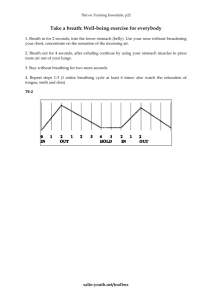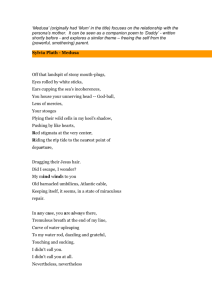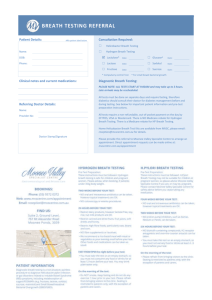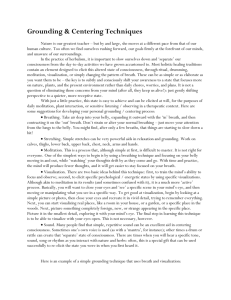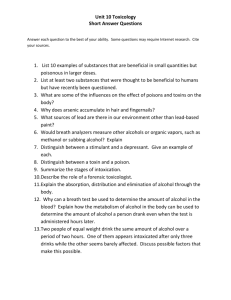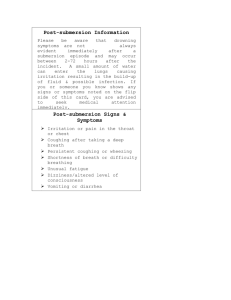November: Respect - TikkunMiddotProject
advertisement
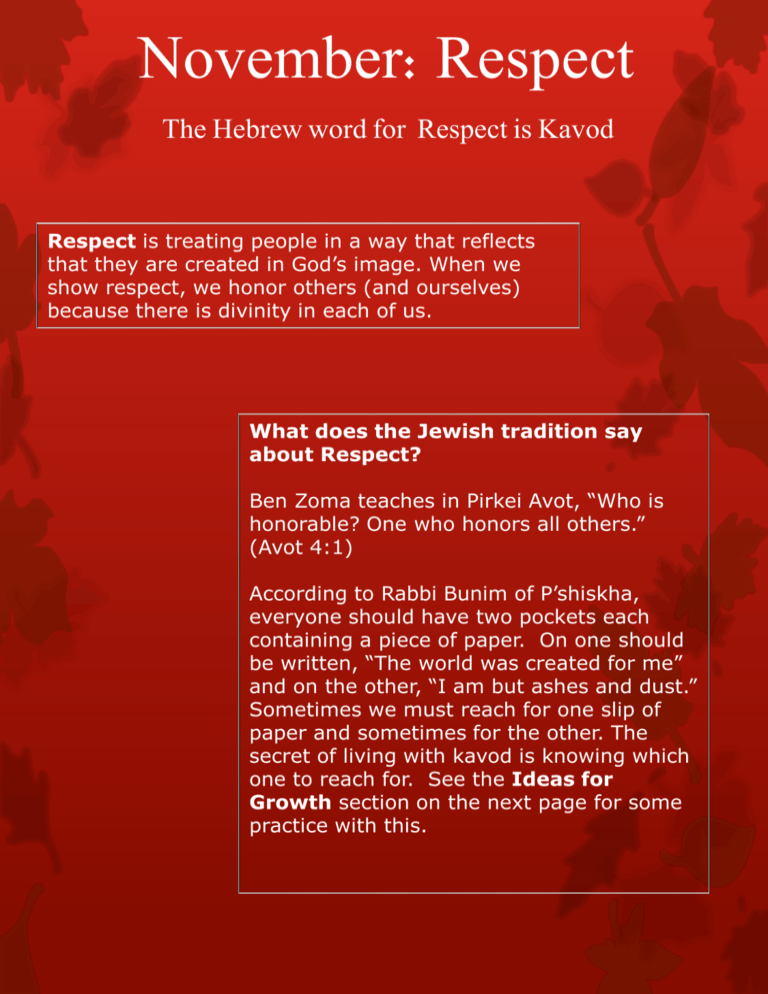
November: Respect The Hebrew word for Respect is Kavod Respect is treating people in a way that reflects that they are created in God’s image. When we show respect, we honor others (and ourselves) because there is divinity in each of us. What does the Jewish tradition say about Respect? Ben Zoma teaches in Pirkei Avot, “Who is honorable? One who honors all others.” (Avot 4:1) According to Rabbi Bunim of P’shiskha, everyone should have two pockets each containing a piece of paper. On one should be written, “The world was created for me” and on the other, “I am but ashes and dust.” Sometimes we must reach for one slip of paper and sometimes for the other. The secret of living with kavod is knowing which one to reach for. See the Ideas for Growth section on the next page for some practice with this. Mindfulness Guide Try this meditation together: Center yourself on a seat or the floor. Close your eyes. Take a deep breath. And now another. Imagine that your body has a light inside of it. Deep, deep down. It is the light of your soul. It is the light of your own goodness. Imagine travelling through your body down to that light and seeing the brightness surround you. This is a place that is always available to you, just by breathing deeply. Follow your breath. Feel it go down your nose, following the path all the way down into your belly. As your breath goes down, you can feel your belly go out. Let it sit there for a moment and see the glow of light. Then bring your breath back up as though it were on an elevator going from your belly, up, up, up and out through your nose. Take another deep breath, down into your belly; let it be there briefly and then as the breath comes up and out of your nose, smile. Practice that three times. You are bringing the light of your soul into the world. Ideas for Growth Have each member of the family write down the two messages Rabbi Bunim spoke of, holding one in each hand. Read the following scenarios and discuss which paper you would reach for in each situation: • There is a girl in your class who just came back from a trip to Spain. All she was doing was talking about her adventures. You could tell that she was excited to share, but you were feeling badly because you haven’t had any trips like that. Which paper would you pull out if you wanted to give her the time to share her excitement? Ideas for Growth cont. • There is a girl in your class who just came back from a trip to Spain. All she was doing was talking about her adventures. You could tell that she was excited to share, but there were a few questions you had for the teacher about the assignment and this girl would not stop talking. Which paper would you pull out if you wanted to get the answers to your assignment questions before the bell rings? • You and your parents are at a barbecue at your cousin’s house. Your parents say it’s time to go home, but you don’t want to and so you yell, “I don’t want to go home now! Let’s stay longer, PLEASE!” Which paper would you pull out if you wanted your parents to know that you respect them? • You and your parents are at a barbecue at your cousin’s. Your parents want to stay, but you know that you have a lot of homework to do and you’d like to do that before you get too tired for school the next day. You say, quietly to your mom, “I know you want to stay but I really do have a lot of homework to get done tonight.” Which paper would you pull out in this situation? Questions for Family Discussion • Would your life look different if you respected yourself more? How would you treat yourself with regard to your health? To your work/schoolwork? • Share examples of giving and/or receiving kavod. How did you feel? Where in your body could you feel this feeling? • Read the following scenario: A boy is telling a group of friends at Religious School about a family vacation he just returned from. His sister interrupts him and loudly says, “No… That’s not where we went first! That was our second stop on the trip!” What is the impact of her lack of respect toward her brother? On him? On her? On the group of friends? • What are some ways you can honor members of your family? Kids, try asking your parents what you could do that would feel respectful. Parents, try asking your kids the same question. • What are the ways in which you show respect for your teachers/bosses? Is it different from how you show respect to your peers? Why or why not? • What does it mean that we are each made in the Divine image or that there is Divinity in each of us? How does remembering this idea help us to act in respectful ways? Portions of this month’s packet are taken from the Family Tikkun Middot Curriculum, Draft. 2014. Miki Young and Institute for Jewish Spirituality
